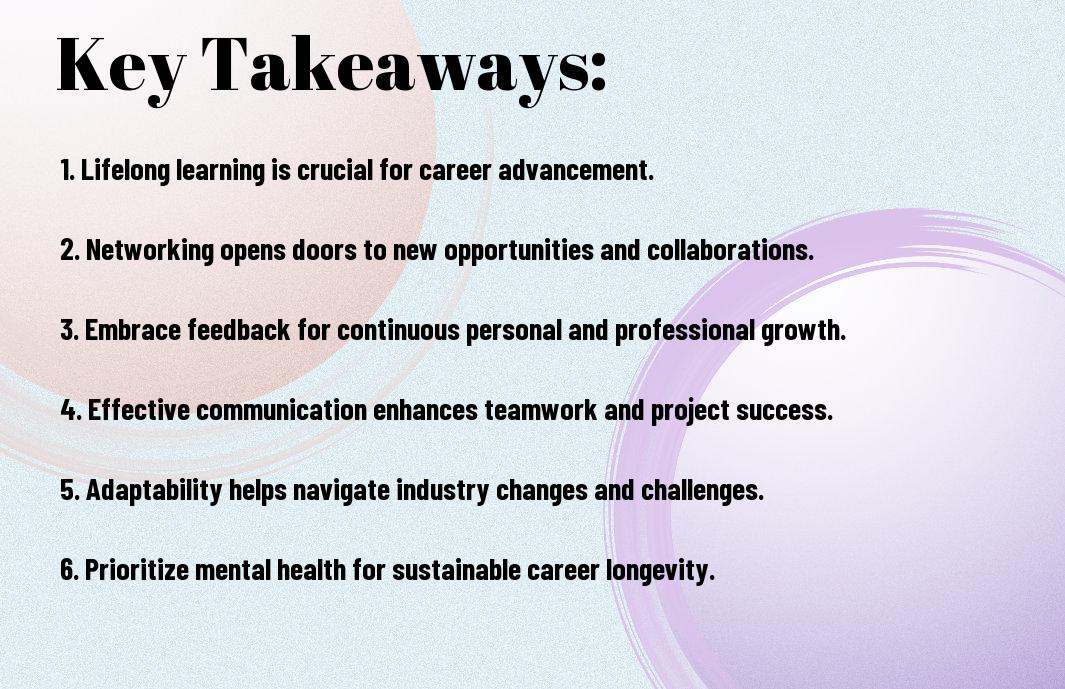Many software engineers find themselves navigating a complex and ever-evolving landscape throughout their careers. This blog post offers valuable insights and timeless advice tailored specifically for you, whether you’re just starting out or looking to refine your skills. You’ll discover key strategies to enhance your productivity, foster collaboration, and address the unique challenges that arise at each stage of your professional journey. By leveraging these insights, you can make informed decisions that lead to long-term success in your software engineering career.
Key Takeaways:
- Software engineers can benefit from tailored advice that aligns with their career stage, whether they’re just starting or seasoned professionals.
- Staying updated on industry trends and best practices is vital for continuous growth and adaptation in the ever-evolving tech landscape.
- Networking and collaboration with peers can provide valuable insights and opportunities for personal and professional development.
Essential Skills for New Software Engineers
The path to becoming a successful software engineer begins with acquiring a solid foundation in important skills. It’s important for you to recognize that mastering these skills will not only enhance your technical capabilities but also make you a more desirable candidate in the job market. As you embrace this journey, take a moment to explore insights such as Timeless Advice from Three Decades in Software Engineering that can guide you along the way.
Foundational Programming Languages
Engineers at the outset of their careers should focus on becoming proficient in foundational programming languages. Languages like Python, Java, or JavaScript serve as excellent starting points due to their versatility and widespread use across various applications. Understanding the syntax, principles, and basic algorithms within these languages will build a strong technical foundation, allowing you to tackle more complex projects with confidence as you progress in your career. Additionally, being comfortable with multiple languages will enable you to adapt to different roles or projects more readily, enhancing your employability.
Understanding Version Control Systems
Software development is inherently collaborative, and understanding version control systems (VCS) is pivotal to effective teamwork. By using a VCS like Git, you can efficiently manage code changes, collaborate with others, and maintain a history of your work. This skill not only enhances your productivity but also minimizes the risk of conflicts and errors during the development process. Specifically, version control allows you to track changes, revert to previous states, and work with branches, so you can experiment without jeopardizing the integrity of your main codebase.
Foundational knowledge in version control systems is an important asset for any new engineer. It lays the groundwork for collaborative coding, encourages effective communication with team members, and cultivates a disciplined approach to coding practices. By effectively utilizing VCS, you can streamline your development process, reduce frustration during team projects, and foster a more organized workflow that aligns with best practices in the software engineering industry. Embracing these tools right from the start will enhance your confidence and competence in your career.
Building a Strong Portfolio
One of the most effective ways to showcase your skills as a software engineer is by building a strong portfolio that reflects your abilities and passion for coding. A well-curated collection of projects not only demonstrates your technical expertise but also your creative problem-solving skills. It’s crucial to focus on creating meaningful projects that align with your interests and career goals. This approach not only makes your work more enjoyable but also creates a narrative that potential employers can relate to.
Creating Meaningful Projects
Below, you should strive to create projects that solve real-world problems or offer unique functionality that excites users. When dicking out projects, consider tackling issues in your community or building tools that align with industry trends, as this enhances the relevance of your portfolio. Each project should integrate various programming languages, frameworks, or technologies to showcase your versatility. Additionally, incorporating thoughtful documentation and clear objectives into your projects can shed light on your overall thought process, which is integral to every employer’s evaluation.
Utilizing GitHub Effectively
At the same time, utilizing GitHub effectively can significantly elevate your portfolio and professional presence in the software engineering community. GitHub serves as a platform not just for hosting your code but as a central repository to engage with other developers through contributing to open-source projects, which raises your visibility. To make the most of GitHub, ensure you maintain an active profile showcasing your best work; utilize clear commit messages and appropriate branching strategies to highlight your development workflow. Your README files should be informative, outlining project features, installation steps, and usage guidelines, making it easier for others to interact with your work.
Consequently, your GitHub profile becomes an interactive resume that speaks volumes about your commitment to continual learning and collaboration. The more effectively you present your projects, the more likely you will attract attention from potential employers or collaborators looking for passionate developers. Engaging with others, participating in discussions, and contributing to projects signals to the community that you are not only skilled but also deeply invested in improving the open-source ecosystem. This level of interaction can open doors to opportunities that might otherwise remain inaccessible.
Networking and Collaboration
For software engineers, building a strong professional network is an necessary aspect of career growth. Engaging with peers, mentors, and industry experts can open doors to new opportunities, collaborations, and insights that you might otherwise miss. As you progress in your career, prioritizing relationships within your professional community will provide not only support but also valuable perspectives that can enhance your technical skills and understanding of the industry landscape.
Attending Meetups and Conferences
With the rapid evolution of technology, attending meetups and conferences can serve as a great catalyst for your professional development. These events are designed to bring together like-minded individuals who share your passion for software engineering. They provide an excellent platform for networking, where you can exchange ideas, share experiences, and learn about the latest trends and innovations in your field. Moreover, you may have the opportunity to engage with industry leaders through talks or panel discussions, allowing you to gain insights that can greatly influence your career trajectory.
Engaging in Open Source Projects
Beside attending events, engaging in open source projects can significantly enhance your collaborative skills and technical proficiency. Participating in these projects allows you to contribute to real-world applications while working alongside other talented individuals who may have diverse perspectives and skill sets. This collaborative experience not only helps build your resume but exposes you to practical problem-solving and coding practices that can be highly beneficial as you advance in your career.
For instance, contributing to an open source project can help you showcase your abilities while also strengthening your technical expertise. You will encounter a wide range of coding styles and solutions as you collaborate with others, allowing you to strengthen your adaptability and problem-solving skills. Additionally, the sense of community within open source environments can provide networking opportunities that may lead to career advancements or collaborations on future projects. Ultimately, these experiences enhance not just your technical skill set but also your ability to work closely with a diverse team, which is increasingly valued in today’s job market.

Advancing Your Career
Now that you have garnered some experience in software engineering, it’s time to focus on advancing your career. This phase is all about building upon your current skill set and seeking new opportunities that can elevate your professional trajectory. One effective way to achieve this is by actively engaging in mentorship relationships. By finding a mentor within the industry, you open yourself up to invaluable insights and expert guidance that can steer you in the right direction. These relationships can provide you with perspectives you may not have considered and help you navigate complex professional landscapes.
Seeking Mentorship Opportunities
Behind the scenes of every successful software engineer, there is often a mentor who has played a significant role in shaping their career. These mentors can offer personalized advice, share their experiences, and guide you through both technical challenges and career decisions. Actively seeking mentorship opportunities can lead to the identification of your strengths and weaknesses, which is necessary for personal and professional growth. Don’t hesitate to reach out to experienced professionals at your workplace, industry meetups, or even through social networks like LinkedIn.
Learning New Technologies
Behind the fast-paced world of software engineering lies the importance of continuously learning new technologies. Your ability to adapt to new trends and tools not only enhances your skill set but also increases your marketability in an evolving job landscape. As you progress in your career, staying abreast of advancements in programming languages, frameworks, and development methodologies is vital. You should actively engage in online courses, attend workshops, and participate in community forums to ensure you’re always at the forefront of technological change.
This emphasis on learning new technologies often translates into better job performance and opens up opportunities for larger projects or leadership roles. Investing time in upskilling not only showcases your commitment to your career but also makes you a valuable asset to any organization. Exploring emerging technologies can lead you to preferred roles and higher salaries, igniting your passion and enthusiasm for software development even further. Stay curious and be proactive in seeking out the knowledge required to keep pace with the industry. Embrace this journey of continuous learning, and you will set yourself apart in a competitive job market.
Best Practices in Software Development
Keep in mind that adopting best practices in software development can significantly enhance the quality of your work while improving team collaboration. You should familiarize yourself with various methodologies that can streamline your development process. One effective approach that has gained popularity is the use of Agile methodologies. By emphasizing iterative progress, Agile allows you to adapt to changes more easily and deliver functionality incrementally. This means that instead of a lengthy development cycle, you have the opportunity to review, test, and refine smaller portions of your project regularly.
Agile Methodologies
Beside implementing Agile methodologies, you should also take advantage of concepts like Scrum or Kanban to enhance your project management. These frameworks not only improve your team’s productivity but also encourage transparency and accountability. By holding regular stand-up meetings and sprint reviews, you can ensure that everyone is aligned with the project goals and can quickly address any blockers that may arise. This fluidity can lead to more satisfied clients as you deliver working software in shorter time frames, allowing you to gather and implement feedback swiftly.
Code Review Techniques
After establishing your development process, you must recognize the importance of effective code review techniques. Code reviews provide an opportunity for you to instantly improve the quality of your codebase and learn from your peers. Engaging in this practice not only helps in catching bugs but also ensures that your code follows consistent standards and best practices. Introduce structured code review sessions where you can provide and receive constructive feedback; this collaborative environment fosters growth and enhances team dynamics.
Practices such as using pull requests and checking code against standardized guidelines can significantly boost the effectiveness of your code reviews. You should aim for a balance between thoroughness and efficiency, keeping discussions constructive and avoiding personal attacks. Additionally, employing automated tools can help you catch basic errors before they reach the review stage, freeing up your team to focus on more complex issues. These techniques will empower you to write higher-quality code, reduce technical debt, and ultimately lead to more maintainable software systems.
Work-Life Balance for Engineers
All software engineers face the challenge of maintaining a healthy work-life balance, especially given the demanding nature of the tech industry. As you navigate your career, it’s vital to proactively manage your time and energy to avoid the pitfalls of excessive overtime, which can lead to stress and burnout. Implementing effective time management strategies not only helps you stay productive at work but also ensures that you carve out time for familial and personal interests. Regular breaks, setting clear boundaries, and prioritizing mental health are invaluable steps you can take to build a sustainable work lifestyle.
Managing Stress and Burnout
For many engineers, the pressure to meet deadlines and exceed expectations can lead to overwhelming stress and eventual burnout. Identifying the signs of burnout early can help you take action before it impacts both your professional and personal life. Engaging in open conversations with your manager about workload and deadlines can offer insights into adjusting expectations or redistributing tasks. Incorporating mindfulness practices like meditation or deep breathing exercises during the day can also help alleviate stress, ensuring that you feel balanced and ready to tackle challenges as they arise.
Importance of Hobbies and Downtime
Managing your time effectively also means prioritizing hobbies and ensuring you take time for downtime. Balancing the intensity of programming tasks with leisure activities can recharge your mental batteries, help to foster creativity, and provide a much-needed escape from the screen. Engaging in hobbies allows you to explore interests outside of your professional realm, promoting a well-rounded lifestyle that can enhance your focus and productivity when you return to work.
Also, involving yourself in activities unrelated to technology can lead to innovative ideas and fresh perspectives on programming challenges. Whether it’s playing a musical instrument, painting, or hiking, indulging in hobbies not only serves as an avenue for relaxation but also contributes to your overall well-being. Taking your mind away from coding for even brief periods provides the mental clarity needed to tackle tough problems more effectively, aiding both your personal growth and career progression.

To wrap up
With these considerations, you can enhance your journey as a software engineer, regardless of where you currently stand in your career. The insights provided in various featured headlines offer timeless advice that can help you navigate the challenges and opportunities that lie ahead. Whether you are just starting out or looking to make a shift in your professional path, these principles can serve as a valuable guide. You may find it beneficial to explore resources such as The Complete Software Developer’s Career Guide: How to …, which can further equip you with the tools needed for success in this dynamic field.
Your growth as a software engineer hinges on your willingness to adapt, learn, and implement the advice that resonates with you. By applying these timeless insights, you are taking concrete steps toward not only enhancing your technical skills but also improving your overall career trajectory. Your commitment to continuous improvement will pave the way for fulfilling and rewarding experiences in the ever-evolving world of technology.
Q: What kind of advice can software engineers expect from these headlines?
A: The headlines provide a variety of advice tailored to the diverse challenges and milestones faced by software engineers throughout their careers. Topics may include best practices for coding, effective communication within teams, strategies for continuous learning, tips for career advancement, and guidance on navigating workplace dynamics. This advice is designed to be relevant for both new engineers entering the field and experienced professionals seeking to hone their skills.
Q: How can these insights be applied practically in a software engineering career?
A: Engineers can apply these insights by adopting recommended habits and approaches highlighted in the headlines. For instance, they might integrate new coding practices into their daily work, explore learning resources suggested for expanding their skill set, or implement soft skill strategies to improve teamwork and collaboration. By actively utilizing these insights, engineers can enhance their professional development and work effectively within their roles.
Q: Are the insights tailored for specific levels of experience among software engineers?
A: Yes, the headlines are crafted to address different levels of experience. Beginners may find foundational advice on learning programming languages, while mid-level engineers might benefit from insights on project management and leadership skills. Senior engineers can explore topics related to mentoring and strategic decision-making. This targeted approach ensures that all professionals can find relevant, actionable guidance to support their career growth.
